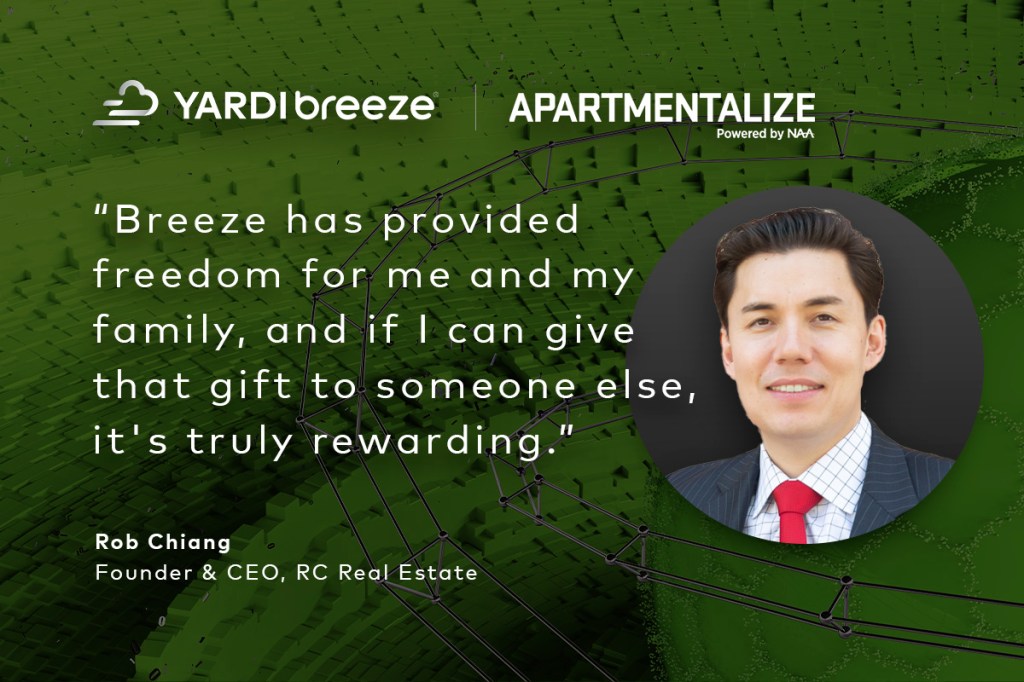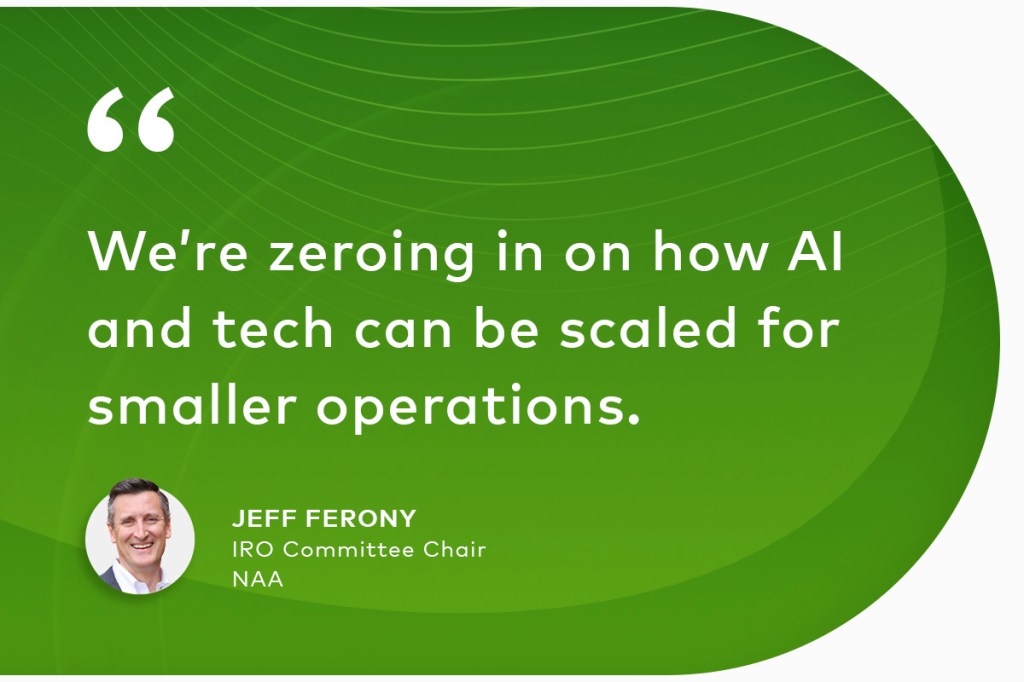
Rob Chiang is an experienced property manager who works out of the Bay Area. In recent years, he’s expanded his horizons to become a bestselling author (7 Step Blueprint to Passive Wealth: Property Management Made Simple), real estate coach, industry speaker and distinguished Yardi Ambassador.
In advance of Rob’s upcoming presentation at Apartmentalize Powered by NAA 2024 called Pivot From Working “In” Your Business To “On” Your Business, we wanted to catch up with him to discuss his life and goals at the middle stage of his career. Whether you’ve been in this industry for decades or just acquired your first property, Rob’s specialty is helping property managers think beyond a great work life to focus on what makes a great life.
His advice is smart, actionable and attainable by anyone who wants to reduce energy spent on their business and free up more time to enjoy a fulfilling life.
Background & experience
Interviewer: Tell us about your background and what led you to become a business coach.
Rob Chiang: I’ve had a bit of a journey. I started out in real estate construction and became a commercial broker for retail buildings. Four years in, I failed. I switched paths and became a house flipper in low-income neighborhoods. I did that for a few years, then transitioned to handyman, which led to becoming a licensed general contractor. Eventually, I became a maintenance manager. It was after I transitioned again to off-site apartment manager that my portfolio started to develop. This is kind of my “hero’s story” arc.
At some point, I hired a realtor coach — not a property management coach — and he helped me get into the right mindset. I could take ideas and run with them, which expanded my business significantly. I eventually had six coaches, one of whom suggested it was time for me to give back. They encouraged me to coach, speak and do podcasts. They showed me that fulfillment comes from stepping outside your comfort zone and selflessly giving back. That’s how I became a coach.
Life inspiration
Interviewer: In your seminar, you talk about your father. How did he inspire your life and career?
Rob: You know how some parents are better suited to align with their kids’ way of thinking once they get older? That was my dad.
When I was in college, I was flipping sneakers, mostly Nike shoes. I remember coming home one day with a pair they only made 25 of, worth $2,000. I was so proud, and I showed my dad. He said, “Son, I’m proud of you, but that’s peanuts. Stop doing that right now. I’m going to teach you real estate.” Initially, I felt insulted, but later I realized he was preparing me for the real world.
He started me at the bottom. I learned handyman skills and property maintenance with my uncle. I did all the grunt work: cleaning apartments, painting, doing wood repairs, crawling into crawl spaces and carrying materials. Once I had that foundation, he taught me how to invest, buy, manage and sell properties.
My dad was the first in our family to come to the U.S. from Taiwan. He went to college and earned two master’s degrees in two years. I know that he studied like crazy and barely slept, taking a cat nap every day from three to four o’clock to catch up.
He inspired me to model his business behavior when making deals, building relationships and finding value in any market. He always taught me to get the value deal in any market, and that would lead to success.
A perfectly imperfect hero
Interviewer: You say your father is your “imperfect hero.” Explain what that means to you.
Rob: I think it’s important to know that nobody is perfect. You want your kids to grow up and be as good or better than you are, to have more opportunities to succeed than you did. My dad was successful, but he never got out of a scarcity mentality. He’s a multimillionaire but would still buy us food from the Walmart deli and make it last for three or four days. I’d tell him he needed better nutrition, suggesting meal plans or even a chef.
But he’d say, “No, son, I’m eating for $1 a meal. What about you?”
I’d reply, “I’m eating out. It costs me $20 to $40 a meal.”
He’d then say, “See, I can sustain. How can you sustain?”
He was always teaching me, but sometimes he was teaching while he was suffering. That’s why I call him my imperfect hero. I’d like to see him enjoy his life more. Does that make sense? It’s like those people in the 1980s who put plastic on their couches. I’d think, “Why not just sit and feel the fabric on the couch?”
The big picture
Interviewer: How does your background connect to your central idea of looking at the big picture?
Rob: I share personal stories in my seminars because they resonate with people. A lot of us are dealing with regrets or trying to avoid future regrets, and we all want to know how to live life to the fullest. For a lot of property managers, work can be all-consuming. People lose sleep, unable to find balance. They pour everything into building a successful career but neglect other areas like health, relationships, contributing to society and giving back.
Certain aspects of their lives are out of balance, and that’s where I come in as a coach. I try to identify these imbalances and nudge them in the right direction to help them find a more fulfilling and balanced life.
Rating satisfaction levels
Interviewer: You ask people to rank different areas of their lives: business, relationships, finance, etc. What areas do people seem most and least satisfied with?
Rob: As far as being most satisfied, my seminars are at business conferences, so you can assume that everybody is deeply invested in the business category. When they’re leaving home to go to a business conference for three or four days, their business scores are usually high. They’re satisfied because they’re getting joy from the office. This is how and where they contribute to society, socialize and find fulfillment. It all comes from work.
However, this often means they lack balance in other areas. They might not have friends or hobbies outside of work. My mission is to help people find what they’re looking for. Everyone’s goals are different. I think my journey is important to share so others can better see how they might approach their own.
There are areas where people are less satisfied. In general, there’s a lot of stress around work despite being satisfied with work. Business might be going great, but maybe a few properties are nightmares weighing them down. Problematic tenants can bother the staff daily, which in turn stresses the managers, potentially leading to unhealthy coping mechanisms to relieve stress.
I help my clients stay solution focused. Addressing these issues can be as simple as dropping a couple of problematic accounts or referring them to another property management company that would be a better fit. Hiring a new employee or a virtual assistant to filter important calls can also make a big difference. Simple changes can significantly improve personal health and overall satisfaction.
Technology: key to happiness?
Interviewer: What role does technology play in improving satisfaction with work and life overall?
Rob: Personally, I love technology. The truth is that property management isn’t glamorous. It’s a lot of blue-collar work managed by a few white-collar workers. The technology aspect is all about efficiency, tracking, managing efficiency and reporting.
If I can get a feature to work without too much implementation time, and it’s easy to manage and track, I’m all about it. Technology is incredibly helpful: it replaces payroll, speeds up processes and reduces errors.
For example, we just finished taxes. The government asks for detailed information from up to 16 months ago. Trying to remember all of that in your head is impossible, and it’s hard to do with paper as well. But with technology, you can keep all the data in the cloud, stress free. You can access everything with a few clicks on your computer.
Imagine you’re in the grocery store and get a call for information. They’re not calling your bookkeeper. They’re calling you. You can look up what they want on your phone in about 30 seconds. Seven years ago, if I were on a trip and needed that information, it would be back in my office, in my computer or file cabinet. This meant either cutting my vacation short, sending someone to the office or spending hours on the phone trying to find what they needed.
You choose your path: be carefree and use technology or use old-school methods that come with a lot of stress.
Fear of change
Interviewer: Why do some people resist change even when it will make their lives easier?
Rob: I think it’s fear of change. People have established patterns such as writing checks, handing it to someone in person and getting a carbon copy receipt in return. This process makes them feel secure. However, in a high-volume, scalable business, these methods don’t work. There’s too much chance for human error. Checks can get lost or not processed by the teller. We’ve experienced these issues over the past 27 years. Even cashier’s checks can get lost or not received. It’s just a pain. Electronic payments never get lost. The only issue is occasionally bouncing due to insufficient funds.
Even the most resistant tenants eventually sign up for electronic payments when they need to submit a work order and the only way to do it is through the resident portal. Suddenly, their credentials work, and they figure out the system. It’s amazing how everyone can learn to use the computer or mobile app when it’s necessary, despite previously insisting on sending checks.
How much free time is enough … or too much?
Interviewer: You reference a study that finds people need about two hours of discretionary time to boost overall life happiness.
Rob: Some people think that when they build and sell their company for a certain amount, they’ve met their life goal. They imagine they’ll retire, sit on the beach and do nothing. But is it anyone’s dream to be a sloth? No. We need some friction, some grind, to make progress.
You might not stay in real estate forever, but you’ll need a new passion afterward. It could be pickleball, shuffleboard, bingo, poker, hiking, golfing or anything else. This new passion can absorb your energy, but having a couple of hours of discretionary time helps us deal with surprises.
Think about how often surprises disrupt our schedules. When your kid is sick, your dog is hurt or you get a flat tire, and you don’t have time to deal with it, you get angry. If you had enough free time, these things wouldn’t be such a big deal. The anger and anxiety come from having other pressing commitments and no time to handle these unexpected events.
Discretionary time is crucial for your physical, mental, emotional and spiritual health. When you’re at your best, you get the most done with your company. As a leader or executive, your employees model your behavior, tone and body language — not just your words or emails. They especially notice you in informal settings, like the break room.
Having those two extra hours makes you more motivational, inspirational and thoughtful. Without them, you might be loud, snappy or impatient, and you might say something insulting. For instance, instead of saying, “The report is wrong, fix it,” you could say, “Hey Dave, do you want to grab a cup of coffee? Can we go over some feedback?” With discretionary time, your delivery improves, you get the most out of your employees and you create future leaders.
Creating leaders means you, as a leader, have more discretionary time because you have reliable substitutes. It’s a benefit for everyone to have that discretionary time for self-care. On an airplane, when there’s trouble, the oxygen masks come down. You’re told to put your mask on first before helping others. You need to be in your best state to help people in the best way you know how.
Property management software’s effect on free time
Interviewer: Has Yardi Breeze made a difference when it comes to discretionary time?
Rob: Absolutely. When I first signed on, I was using an accounting software that only did accounting. I was trying to use it as a property management software, which was like trying to put a square peg in a triangular hole. It didn’t work. I had to use Excel spreadsheets, keep leases on Microsoft Word and do all the rent deposits by hand. Every month, I’d have paper checks, money orders, cashier’s checks and even some cash spread out on a big folding table. I stacked them by property with little post-it notes. There was so much room for error—handwritten deposit slips, hand-carrying them to each bank and a binder for each property. It was ridiculous.
It worked, but it was time-consuming and there were mistakes. One time, an employee took a stack of checks to the bank, and the teller missed one. We ended up serving a tenant with a three-day notice because we had no record of their payment. A few days later, the bank teller found the check stuck to another one during an audit. It was a mess.
Those human errors don’t happen anymore with Yardi Breeze. Our business is fully electronic. Even if tenants pay with cash, it’s all electronically tracked. They can go to Walmart, CVS or 7-Eleven, which are the most common places old-school tenants like to use. They can pay with their debit card, credit card or bank account. We can manually enter the check routing number and bank details over the phone. Lease signing is super easy and all done through Yardi as well.
Breeze is a one-stop shop, a fully stacked solution. It’s like a six-by-six hamburger — more than you can eat in one sitting, but everything you need to keep you going all day. The features keep getting added, and we’re excited for what’s to come.
The Yardi Breeze difference
Interviewer: How did you discover Yardi Breeze, and why did you decide to use it?
Rob: Name recognition is very important, especially in marketing. People make purchases based on familiarity from commercials and other exposures. Personally, I recognized the Yardi name and brand because I’ve been receiving monthly reports from apartment complexes we own since I was a kid. We had two complexes in Fresno, one with about 100 units and another with around 30 units.
The management company used Yardi software, and every month we received these impressive, detailed reports. We’d get a trailing 12-month report that was about 60 pages long. My dad, my imperfect hero, read every single page. He would circle any lines he had questions about and call to get simple answers.
Seeing how thorough and detailed those reports were, I wanted to provide that same level of information and comfort to my clients. That’s why I chose Yardi — it was all based on my positive experience from 30 years ago.
Becoming a Yardi Ambassador
Interviewer: You’re a Yardi Ambassador. What’s that like, and how has this made a difference in your career?
Rob: Some things in my life have come full circle, and I feel incredibly blessed. For instance, I manage properties for a gentleman who offered to be my mentor right after I graduated college. Now, I’m in a position to help him, which feels amazing. I don’t take these opportunities for granted. Another mentor from a commercial real estate firm sold me a property, marking another full-circle moment.
Being a Yardi Ambassador is an absolute blessing. Yardi Breeze has provided freedom for me and my family, and if I can give that gift to someone else, it’s truly rewarding. Nothing in life is free. Everything costs time or money, and that’s okay. I have a mentality of abundance, which positively impacts every aspect of my life.
Interestingly, I’m now a TikTok influencer. This new role is a direct result of my Yardi speaking gigs and seminars, which gave me the confidence to be on camera at a moment’s notice. I talk about real estate, my life and personal experiences to help viewers improve their lives, learn something new or solve a problem they’re facing.
Commitment to action
Interviewer: You end your seminar by asking for a commitment to action. What does that entail?
Rob: Seminars, reading books and going to school are all great, but without action and follow-through, they don’t lead to real change. Follow-through is everything. This might mean booking an appointment or a demo. By setting a specific date and time, you’re making a tangible commitment.
Understanding the connection between A, B, C, D and E is crucial. Booking a demo with Yardi Breeze could give you one to three more hours of discretionary time each day. What would that extra time do for you? It could improve your personal relationships, allowing you to go on dates instead of eating at your desk. It might let you take care of your health by finally getting that physical checkup or dental appointment.
Connecting a technology upgrade to a real-life benefit means you’re not just booking a demo, you’re upgrading your quality of life.
At one point, I had four assistants working for me. I depended on them to manage my operations, but if any one of them was sick, that phase of operations was frozen. With technology, I can depend less on human operations, and the business can run itself until manual intervention is needed. This allows me to be anywhere in the world without worrying about my business.
I want everyone to achieve that freedom. It involves giving up a little bit of control, but the rewards are immense. Use technology to take your time back.
Don’t miss Rob’s Apartmentalize session
Interviewer: Why should independent rental owners attend your presentation?
Rob: Independent rental owners, I’ve been in your shoes, and I am still in your shoes. I want to help you along in your journey. Sometimes, it just takes a slightly different perspective or technique to shift your efficiency to a higher level. Every market is different, and every strategy is unique.
I will share techniques that you can implement immediately. I’m an action man. I’m not here just to tell stories and make you laugh or cry, leaving you thinking, “I liked that guy, but I don’t know what he was talking about.”
By the end of my session, you’ll have a plan in your calendar that’s actionable and practical. If you want actual help, like a quick coaching session, come to my presentation. You’ll get techniques and strategies you can use right away to enhance your efficiency and improve your rental business.



